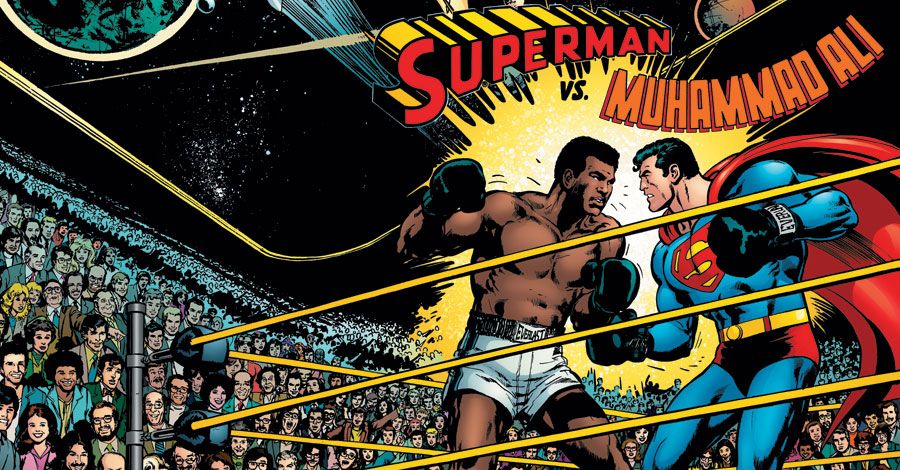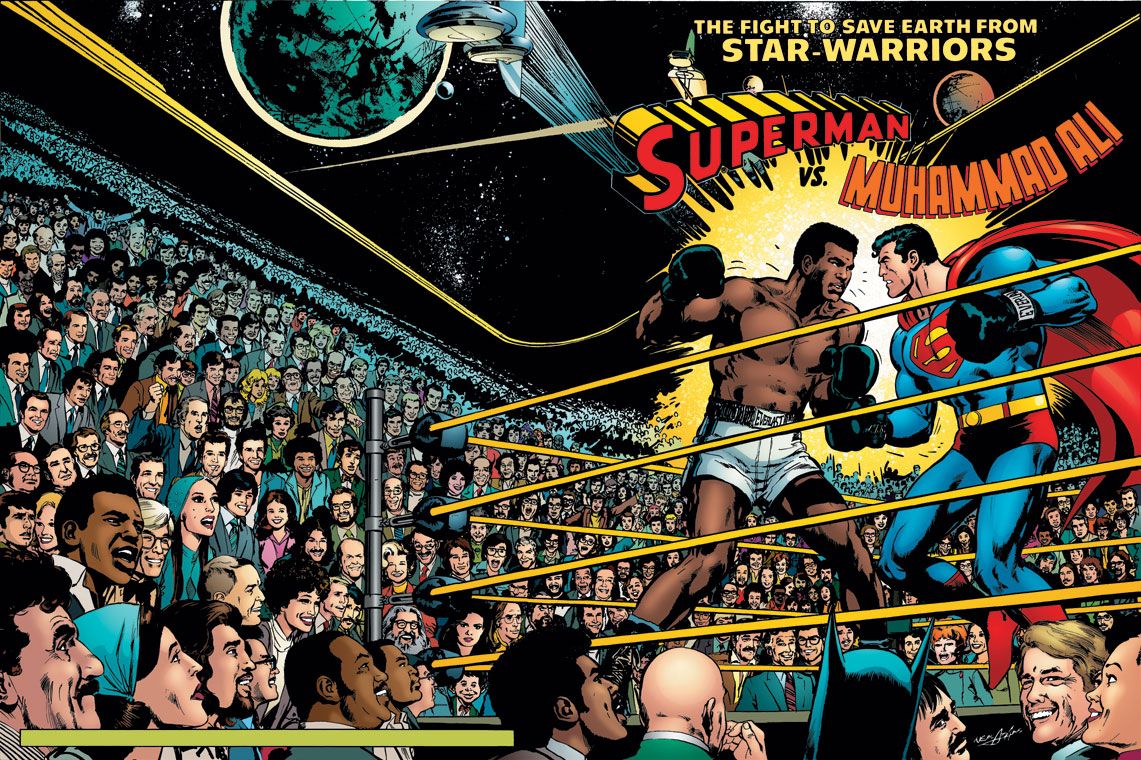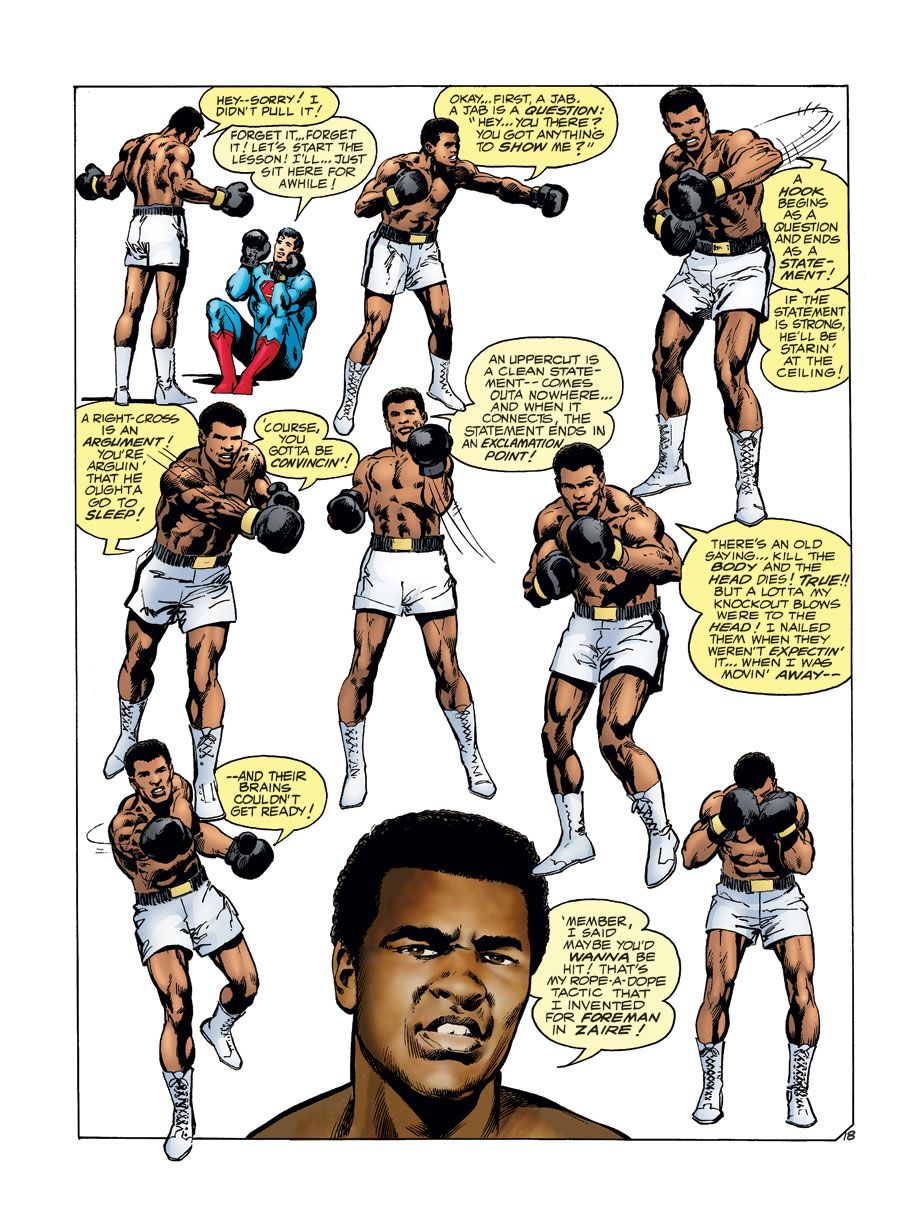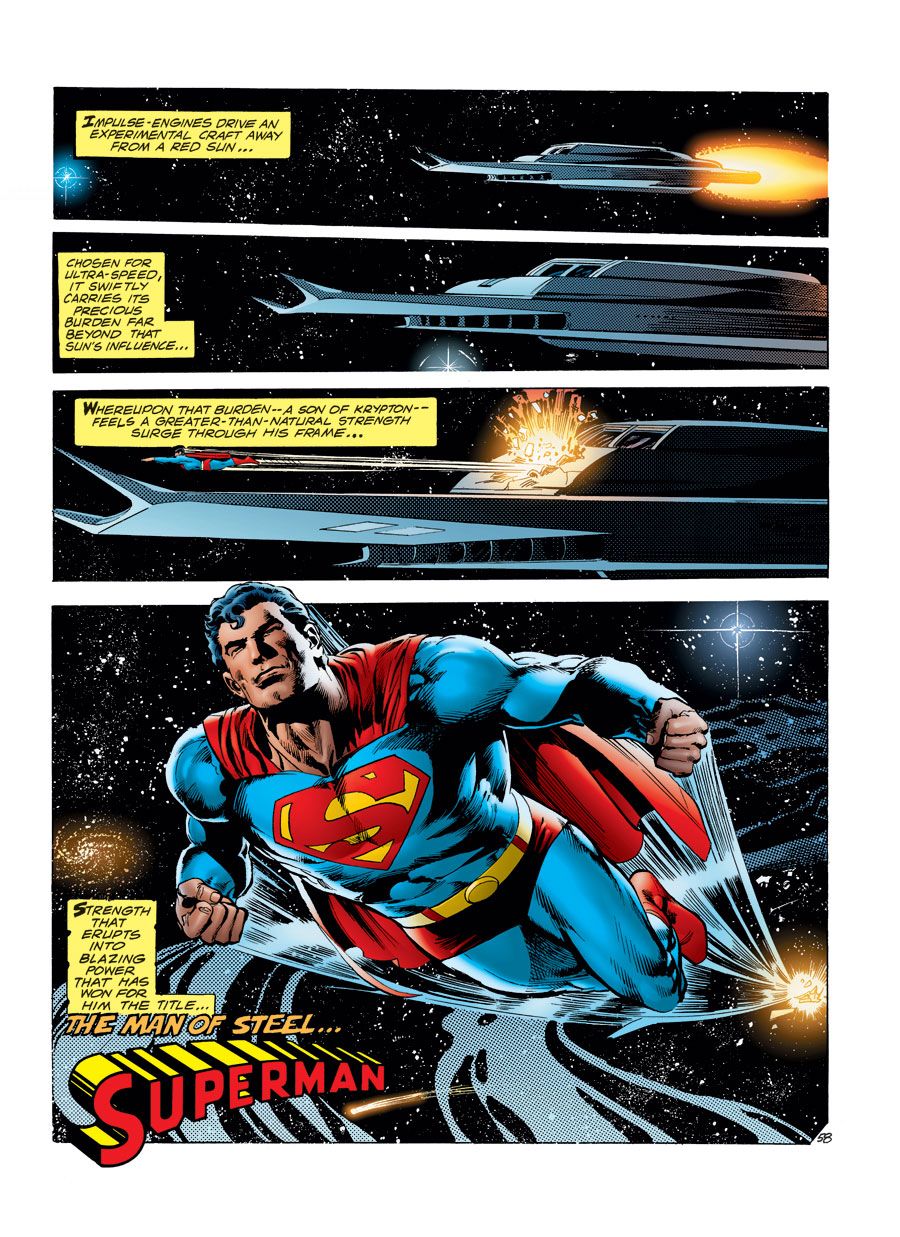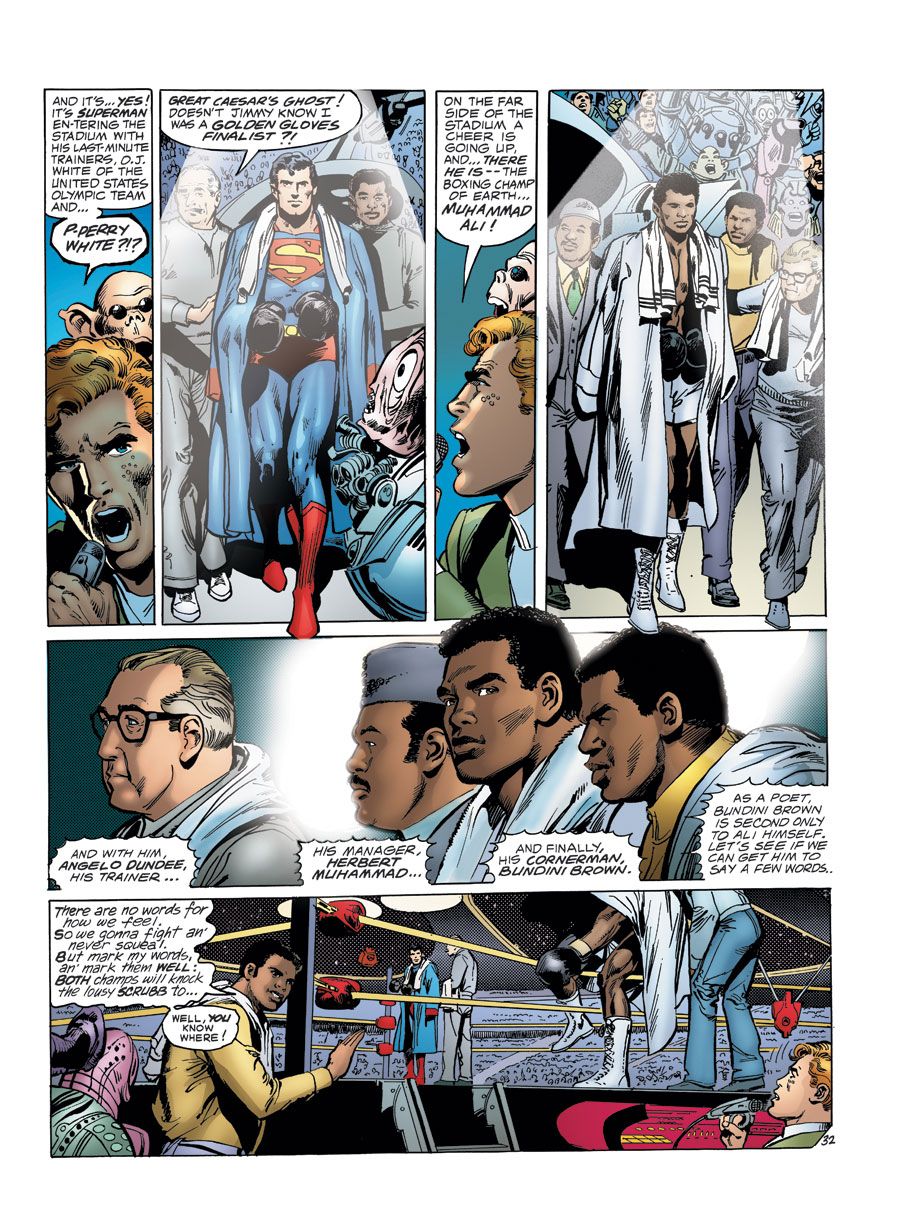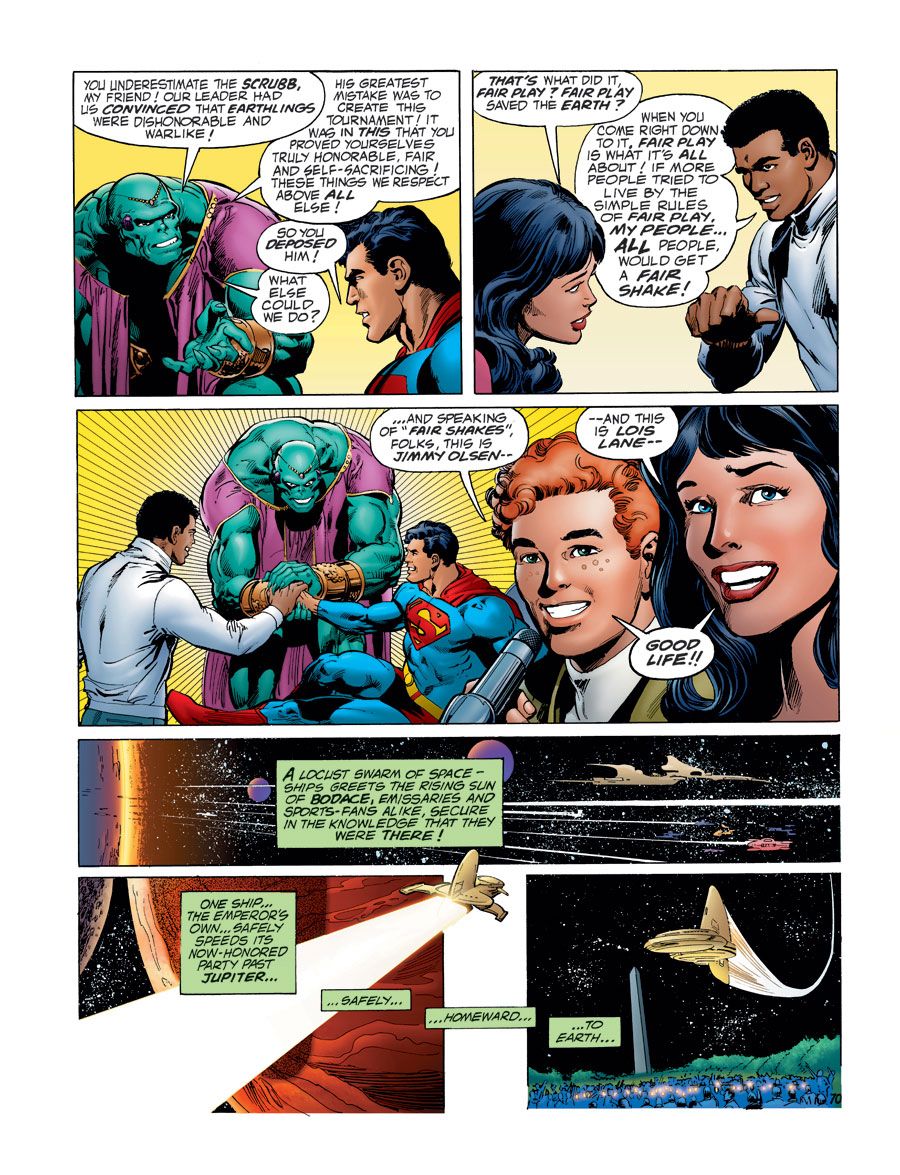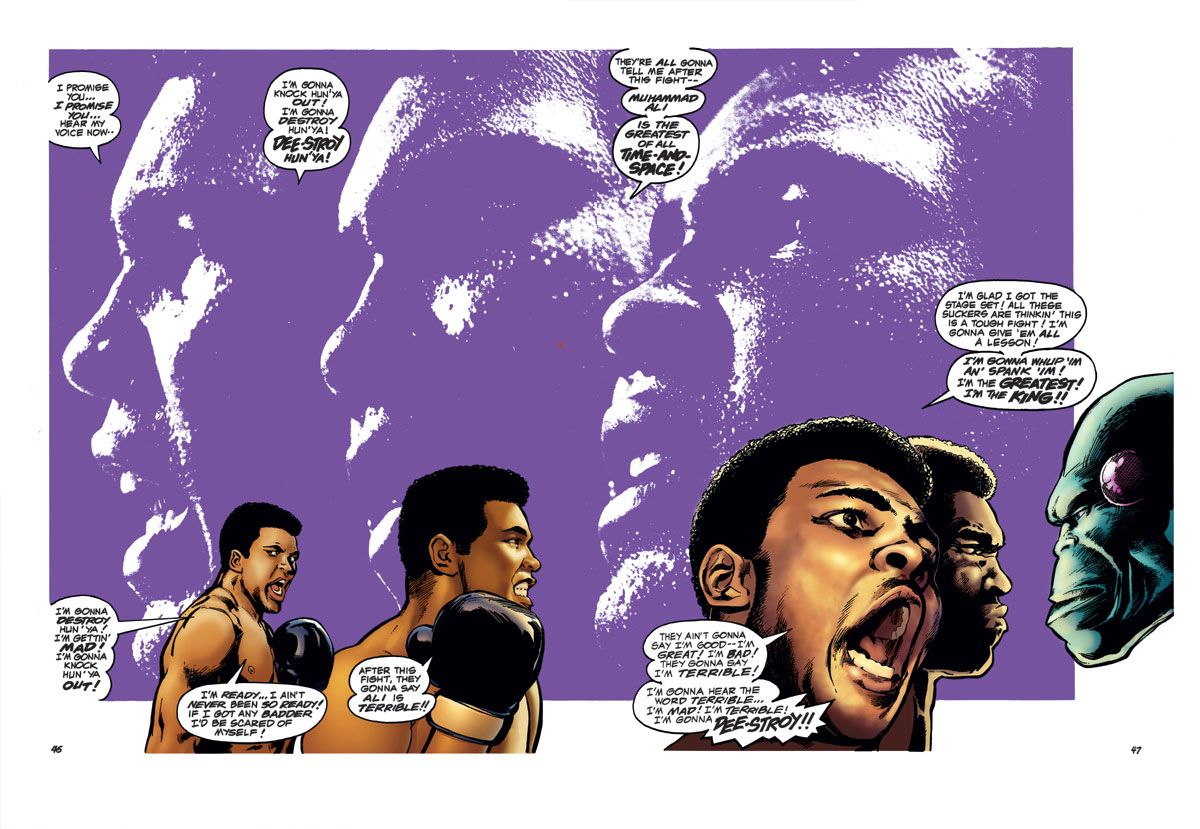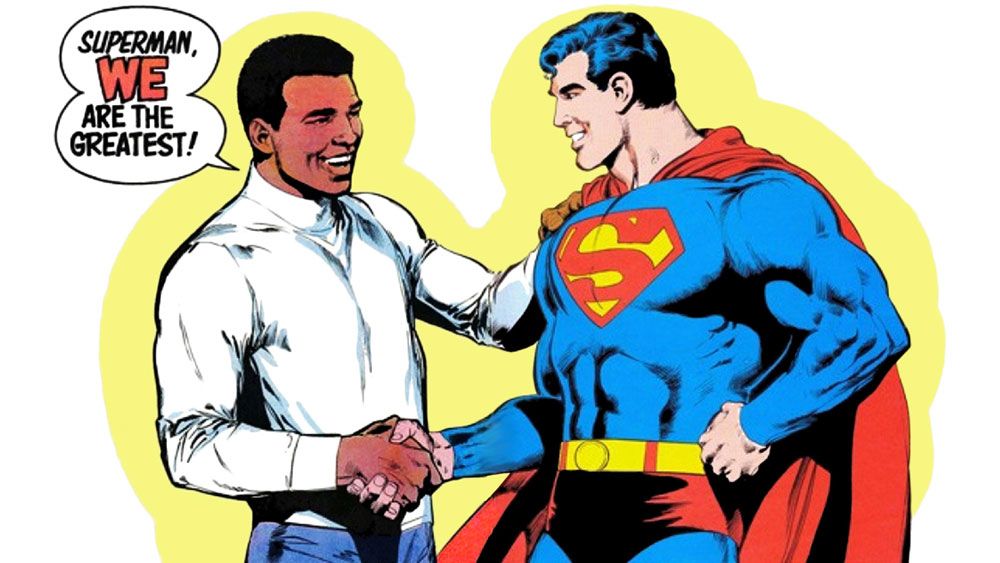Dick Gregory once said about Muhammad Ali, "If people from outer space came to Earth and we had to give them one representative of our species to show them our physical power, our spirituality, our decency, our warmth, our kindness, our humor and most of all our capacity to love -- it would be Ali."
Amazingly, that's pretty close to the plot of "Superman vs Muhammad Ali," the 1978 graphic novel that arguably stands as Neal Adams' greatest comics work. And to this day, it remains a powerful statement about the character of Superman, and who Ali, who passed away June 4, 2016, was.
The book, written by Denny O'Neill and Neal Adams, pencilled by Adams and inked by Dick Giordano and Terry Austin, could have been just another cheap promotional stunt, as most crossovers and event comics tend to be. The premise certainly sounds like one -- an alien race, the Scrubb, threatens Earth and challenges humanity to a one on one fight between their champion and ours. Superman and Ali fight over who will represent Earth, and after Ali wins (because they fight under a red sun), he faces the alien Hun'ya with the fate of the planet hanging in the balance.
Without reading it, it's easy to dismiss "Superman vs Muhammad Ali" as a strange relic from an earlier time, when stories were simpler and guidelines on material was stricter, thanks to the Comics Code Authority. Today, there would have to be more profanity, more blood, more violence and more death, all in the name of "realism." It wouldn't be one 73-page book, but a lengthy miniseries. However, none of that would improve this story, because the simplicity of Adams' tale is also its great strength.
RELATED: Tale of the Tape - Looking Back on "Superman Vs. Muhammad Ali"
My first memory of Ali is of the opening ceremony at the 1996 Olympic Games in Atlanta. That summer, like every summer, the games opened with people handing off the torch to one another until it reached one last person, who would light the cauldron and signal the beginning of the games. It was a secret who the final person would be that year, and my family and I waited with eager anticipation to learn who had the honor. Imagine our excitement when Ali stepped out. The former gold medalist was trembling, his body showing the effects of the Parkinson's disease that had long ravages the world-class athlete. I remember my parents watching that scene because they had a reverence for Ali. You could hear that same feeling in the announcer's voice.
That was the year the Muhammad Ali documentary "When We Were Kings" was released, and around the same time, David Remnick's biography about Ali, "King of the World," came out. They made it clear to me why people spoke about Ali the way they did. He wasn't just a boxer, he wasn't just an athlete. He was a poet and an activist; a performer and a giant. For the millions of people who were watching the 1996 Olympics and only remembered Ali as a young, vital fighter, it as shocking to see him in such a weakened state. And yet, it was impossible not to feel his presence.
As Jenette Kahn wrote in "Muhammad Ali vs Superman's" afterword, the idea for the special came from Don King. In the mid-1970s, Ali was the reigning heavyweight champion, having beaten George Foreman in 1974, and Joe Frazier in 1974 and 1975. Ali was, as Kahn wrote, "[A] folk hero of iconic proportions."
Who else could possibly go toe to toe with Superman? As the book states:
"One is real, one is imaginary... one is human, one is superhuman. But both inspired a nation with their incredible strength, their inspiring examples, and their never-ending battle for freedom and fair play for all."
Denny O'Neill and Neal Adams had famously teamed-up previously on Batman and Green Lantern/Green Arrow. The way that the latter collaboration tackled social issues was no doubt what inspired the publisher to ask the two to work on "Muhammad Ali vs Superman." The fact that they seemed to able to handle just about anything, and that Adams had established that he was, well, Neal Adams, was also a consideration.
This is a book that is many things. It opens with Clark Kent, Lois Lane and Jimmy Olson in the ghetto of Metropolis, where they find Ali playing basketball with kids in the park. There are single-page compositions, presented without panels, where Ali is boxing. There's a two-page splash of Ali, in all his glory, trash talking his opponent. There are pages of Superman battling aliens that are as good, as epic, and as beautiful as any Superman pages that have ever been drawn.
The book features many real world figures, depicted masterfully by Adams. In an edition of the book published a few years ago, it's noted that DC didn't initially realize they needed people's permission to include renditions of them in the work, which caused some complications. However, in the end, the massive spread of real figures, DC heroes, and cartoonists watching Superman and Ali fight is something else.
The book makes sure that Ali's trainer, manager and cornerman get mentioned by name. The latter, whose name was Bundini Brown, even gets a chance to be poetic. For people who don't know, Brown wrote a lot of the lines that Ali is famous for, including, "Float like a butterfly, sting like a bee, your hands can't hit what your eyes can't see."
I don't think that I'm spoiling anything to say that Superman and Ali prevent Earth from being destroyed. But the point is how they do it. Ali defeats the alien champion, but when it's revealed that the Scrubb leader has been planning to destroy Earth all along, regardless of who won, the Scrubb depose their leader.
Comic books often get a bad rap when it comes to dealing with questions of morality. After all, we regularly see political leaders use simplistic narratives and simplistic ideas to sell dangerous ideas to people. However, there is a difference between simple and simplistic. At their best, the morality and the ideas so many of us read in comics were simple, focused more on how you have to outthink your opponent by using your head rather than your fists. They taught us that you shouldn't pick on people who are weaker or smaller, and that you should judge people not by their skin color or religion, but by who they are. Is that simple? Sure -- but it's not wrong.
As an example of this simple but not simplistic sense of morality, in the book, Superman fights Ali in costume. Why? As Jimmy Olson explains:
"It's because many of our alien spectators wouldn't be able to tell the fighters apart! Except for subtle changes in hue, all humans look exactly alike to them..."
Adams, who knows comics probably as well as anyone ever has, was using comics to make a point about comics. After all, this is a medium where so many of the first creators were Jewish, who were denied the chance to work in other fields due to the prevalence of anti-Semitism. For Adams to use the medium of comics to tell a story about these same values is something that is both fitting and subversive.
When Lawrence Linderman interviewed Ali for "Playboy" in 1975 and asked how he thought he would be remembered, Ali answered, "I'll tell you how I'd like to be remembered: as a black man who won the heavyweight title and who was humorous and who treated everyone right. As a man who never looked down on those who looked up to him and who helped as many of his people as he could -- financially and also in their fight for freedom, justice and equality. As a man who wouldn't hurt his people's dignity by doing anything that would embarrass them. As a man who tried to unite his people through the faith of Islam that he found when he listened to the Honorable Elijah Muhammed. And if all that's asking too much, then I guess I'd settle for being remembered only as a great boxing champion who became a preacher and a champion of his people. And I wouldn't even mind if folks forgot how pretty I was."
One of things that changed over the course of Ali's lifetime was the United States. By all accounts, Ali never forgot that he was just a year younger than Emmett Till when the 14 year old Till was kidnapped, beaten, shot and his body dumped in a river -- all because he spoke to a white woman in Mississippi. An all-white jury joked about finding the murderers not guilty, and the two gave an interview after their trial, admitting that they killed Till but didn't believe they had done anything wrong.
At a time when black churches were being bombed on Sundays, and when police officers were beating children and killing protestors, Ali declared himself a conscientious objector to the Vietnam war. As a result, he was banned from boxing for three years, and earned enmity from many people, a feeling that persists in some to this day.
"I am America," Ali once declared. "I am the part you won't recognize. But get used to me -- black, confident, cocky; my name, not yours; my religion, not yours; my goals, my own. Get used to me."
Ultimately, what changed was the United States. What changed was what it means to be American.
"That's the Ali I came to know as I came of age," President Obama said in a statement released shortly after Ali's death. "Not just as skilled a poet on the mic as he was a fighter in the ring, but a man who fought for what was right. A man who fought for us. He stood with King and Mandela; stood up when it was hard; spoke out when others wouldn't. His fight outside the ring would cost him his title and his public standing. It would earn him enemies on the left and the right, make him reviled, and nearly send him to jail. But Ali stood his ground, and his victory helped us get used to the America we recognize today."
Ali wasn't perfect. His taunts towards Joe Frazier were especially cruel. Frazier -- one of the greatest fighters of all time -- admitted that they stung, particularly because he had always supported Ali. Ali turned his back on Malcolm X shortly before Malcolm was assassinated, and it would be years before he left the Nation of Islam. Ali would make inflammatory statements that he would eventually apologize for and walk back.
But through it all, Muhammad Ali was a man who fought for what he believed. He was a great fighter, yes, but what made him a great man had nothing to do with his physical prowess -- something else that Ali and Superman have in common. It was about how he treated and related to people. When the cameras were off, he treated people with the same kindness as when they were rolling.
President Bush, who awarded Ali the Presidential Medal of Freedom in 2005, called him "a fierce fighter and a man of peace."
"The real mystery, I guess, is how he stayed so pretty," President Bush joked. "It probably had to do with his beautiful soul."
Ali said he wanted to be remembered as "a champion of his people." As the world changed, Ali was changed as well. The people he was speaking for were no longer just African-Americans -- he was speaking about everyone. He became a hero beloved by the entire world.
That same world accepted two Jewish creators from Cleveland, and embraced their character, Superman. The Man of Steel has been pointed to time and again as a symbol of immigration, representing the power of immigrants and their important role in the United States. That such a character would team up with Ali, the descendent of slaves and a Muslim, that they could be seen as humanity's champions, and that together they could represent what is best in people, is an example of how America and the world changed in the Twentieth Century.
"Superman vs Muhammad Ali" isn't the greatest comic ever made, but if anyone wants to know why so many people have been paying tribute to Ali, they should read this story.
Artwork courtesy of DC Comics.

